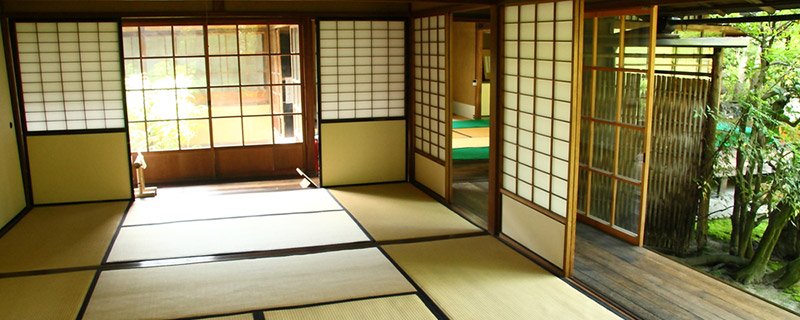Traditional Accommodation

For travellers to Japan, there are many options available when it comes to accommodation. All over the country, there are several kinds of lodgings that can offer anyone a memorable experience that is unique and authentic to Japan’s traditions and culture.
Ryokan
A ryokan is a type of inn that was popularised during the Edo Period as a place for spending a night or two when travelling from one city to another via the main thoroughfares. Today, there are numerous surviving ryokan that are several hundred years old and still operate as guest houses.
Accommodation Features
Rooms in ryokan vary in style, layout, design, size, and furniture. Usually, a room can accommodate between two and four people, and has sliding doors and tatami floors, with a single, small, low table placed in the middle of the room. Some ryokan rooms may include a small sitting room, a balcony, or a porch area that is separated by a sliding door.
Bedding
The typical bedding in ryokan rooms are futons laid on the tatami flooring. The ryokan also provide comforters and pillows. When not in use, these Japanese mattresses and other bedding are kept in a closet by the ryokan employees in the morning when you leave your room. At night, when you are ready for bed, you simply take everything out and lay them on the floor.
Bathroom
Some ryokan rooms have private bathrooms with Western-style sinks and toilets, while others, specifically the older or cheaper ones, only offer shared bathrooms, sinks, and toilets. Some even provide complimentary toiletries, such as soap, toothbrushes and towels, and yukata for use while at the ryokan.
Food
The majority of ryokan include breakfast and dinner in the room prices. They serve traditional Japanese foods (called kaiseki) which typically consist of steamed rice, grilled fish, miso soup, eggs, vegetables, tofu, and tea. They serve the meals at a particular time so as to keep the dishes fresh and at the right temperature for maximum enjoyment, and they request their guests to provide their preferred meal times. Usually, they serve the food in the rooms, but some also have common dining areas. There are ryokan that serve Western cuisine, as well.
Reservations
The most convenient way to book a ryokan room is through online reservation sites. These websites have long lists of ryokan options all over Japan, and they offer good rates and deals, somewhere between 15,000 and 25,000 yen per person a night. Some of the highly recommended ryokan reservation websites are Japanese Guesthouses , Rakuten Travel and Japanican .
Shukubo
Staying overnight at a shukubo, or Buddhist Temple, is on the bucket list of many travellers to Japan. This is not surprising as this type of traditional accommodation offers an exceptional journey, an opportunity to experience the simple yet interesting day-to-day lives of Buddhist monks.
In Japan, there are various cities and regions that have shukubo lodgings, but the most popular is Koyasan. Home to over 50 Buddhist temples, Koyasan welcomes throngs of pilgrims and tourists all year round who want to share in this unique experience.
Accommodation Features
Similar to ryokan, temple rooms are traditional Japanese spaces that have tatami flooring and sliding doors. They also vary in design and size, and can accommodate two, four, or even more people. They generally have one low table and a number of floor seat cushions.
Bedding
Shukubo provide futons, comforters, and Japanese-style pillows to their guests. This bedding is laid out directly on the tatami floors when it is time to sleep, and are kept in a closet in the room during the day.
Bathroom
Most shukubo offer shared washrooms for all their guests. However, there are also the more expensive and luxurious ones that provide private bathrooms with complimentary amenities, such as washcloths, toothbrushes, and soap.
Food
When booking a shukubo, the price includes meals for breakfast and dinner. The staff serve breakfast at around 7 in the morning, after the 6am prayer ceremonies, and dinner is usually at 6 in the evening. The menu consists of vegetarian food, such as koyadofu or freeze dried tofu, yuba or tofu skin, and konnyaku or devils tongue jelly, which make up the monks’ traditional diet.
Other Amenities
Many Buddhist temples are located in large complexes that have several gardens, treasure halls, and baths, which guests can visit and explore during their stay.
Reservations
To make a reservation at a shukubo, which may cost between 3,000 and 20,000 yen a night per individual, you may check out the following websites: Japanese Guest Houses, Japanican , and Shukubo.net, all of which have lists of temple lodgings in Koyasan and other Japanese regions.
Minshuku
Japan’s own version of bed and breakfasts, minshuku are old Japanese houses that have been transformed into lodgings and are run by local families. They are commonly seen in the rural areas, such as in hot spring towns, mountains, countrysides, seasides and ski resorts.
Accommodation Features
Most minshuku have fewer and smaller rooms compared to ryokan and shukubo, but they also feature tatami floors, sliding doors, and closets for futon and luggage storage.
Bedding
Upon check in, guests may find the mattresses, comforters, and pillows stored in their room’s closet. They just have to set all the bedding out on the floor at night for sleeping. When leaving to sightsee in the morning, they may put their bedding back in the closet or let the staff do it.
Bathroom
Shared bathrooms and toilets are the norm at minshuku. This style of accommodation also has Japanese baths which guests can use throughout the duration of their stay.
Food
Food may or may not be included in the price of booking a room at a minshuku. Those that provide breakfast and dinner generally have common dining rooms where all guests who have elected to include meals to their reservations may eat at particular times of the day. They typically serve Japanese and local specialties.
Reservations
Japanese Guest Houses offers an English reservation service for guests wanting to book at minshuku.












